
The men's 200 metres at the 2004 Summer Olympics as part of the athletics program was held at the Athens Olympic Stadium from August 24 to 26. There were 54 competitors from 41 nations. The event was won by 0.22 seconds by Shawn Crawford of the United States, the nation's 17th victory in the men's 200 metres after missing the podium entirely four years prior. His teammates Bernard Williams (silver) and Justin Gatlin (bronze) completed the sixth American sweep in the event and first since 1984.

The men's 200 metre race was held for the third time at the 1908 Summer Olympics in London. The competition was held from 21 to 23 July 1908. NOCs could enter up to 12 athletes. 43 sprinters from 15 nations competed. The event was won by Robert Kerr of Canada, the first win by a nation other than the United States. Americans took silver and bronze, with Cartmell becoming the first person to win multiple 200 metres medals after taking earning silver in 1904.
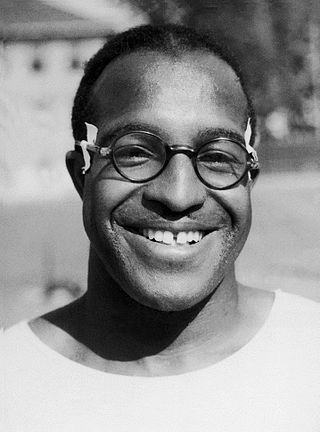
The men's 200 metres sprint event at the 1932 Summer Olympics took place on August 2 and August 3 at the Los Angeles Memorial Coliseum. There were 25 athletes from 13 nations. The 1930 Olympic Congress in Berlin had reduced the limit from 4 athletes per NOC to 3 athletes. After missing the podium entirely in 1928, the United States swept the medals in the event in 1932. It was the second medal sweep in the event by the United States, as well as the nation's sixth victory in eight Games. Eddie Tolan won gold by 0.2 seconds, with George Simpson winning silver and Ralph Metcalfe winning bronze.

The men's 100 metres sprint event at the 2008 Olympic Games took place on 15 and 16 August at the Beijing National Stadium. 80 athletes from 64 nations competed. Each nation was limited to 3 athletes per rules in force since the 1930 Olympic Congress. The final was won by Jamaican Usain Bolt in a world record time of 9.69 seconds. It was Jamaica's first title in the event, and first medal in the event since 1976. Jamaica became the first country to join the men's 100 metre winners since Trinidad and Tobago, also in 1976; Richard Thompson won the country's fourth overall medal in the event with his silver.

The men's 200 metres event was part of the track and field athletics programme at the 1924 Summer Olympics. The first two rounds were held on 8 July, with the semifinals and final on 9 July. Sixty-five sprinters from 33 countries competed. Nations were limited to 4 athletes each. The event was won by 0.1 seconds by Jackson Scholz of the United States, the nation's third consecutive victory in the event and fifth in six Games. For the third straight Games, the podium consisted of two Americans winning gold and silver and a Briton taking bronze. Paddock, the silver medalist in 1920 as well, was the second man to earn multiple medals in the 200 metres.

The men's 200 metres sprint event at the 1936 Olympic Games took place between August 4 and August 5. There were 44 athletes from 22 nations competing. The maximum number of athletes per nation had been set at 3 since the 1930 Olympic Congress. The final was won by 0.4 seconds by American Jesse Owens, with silver going to Mack Robinson. Owens thus reached 3 gold medals in 1936, with the sprint relay still to come. The Netherlands earned its first medal in the men's 200 metres with Tinus Osendarp's bronze.
The men's 100 metres sprint event at the 1948 Olympic Games in London, England, we held at Wembley Stadium on 30 and 31 July. Sixty-three athletes from 33 nations competed; each nation was limited to 3 runners by rules set at the 1930 Olympic Congress. The final was won by American Harrison Dillard, in a photo finish. Lloyd LaBeach of Panama won his nation's first medal in the men's 100 metres, a bronze. This was the first time a photo finish camera was used at an Olympic Games. The photo finish equipment consisted of a photoelectric cell, called the Magic Eye, produced by Swiss watchmaker Omega and a slit photography camera produced by the British Race Finish Recording Company.

The men's 400 metres sprint event at the 1948 Olympic Games took place between August 4 and August 5. Fifty-three athletes from 28 nations competed. The maximum number of athletes per nation had been set at 3 since the 1930 Olympic Congress. The final was won by 0.2 seconds by Jamaican Arthur Wint coming from almost 10 meters back to catch teammate and world record holder Herb McKenley. This was Jamaica's first Olympic gold medal in their debut participation at the Games, and broke a string of 3 straight American victories in the men's 400 metres.

The men's 110 metres hurdles event at the 1948 Summer Olympic Games took place on 3 and 4 August. Twenty-eight athletes from 18 nations competed. The maximum number of athletes per nation had been set at 3 since the 1930 Olympic Congress. The final was won by American William Porter. Porter's compatriots, Clyde Scott and Craig Dixon took 2nd and 3rd place. It was the third of nine consecutive American victories, and the ninth overall gold medal for the United States in the 110 metres hurdles. It was also the first of four consecutive American podium sweeps, and the fifth overall sweep by the United States in the event.

The men's 400 metres hurdles event at the 1948 Summer Olympic Games took place July 30 and July 31. There were 25 competitors from 17 nations. The maximum number of athletes per nation had been set at 3 since the 1930 Olympic Congress. The final was won by American Roy Cochran. It was the nation's second consecutive and seventh overall victory in the event. Duncan White won Ceylon's first Olympic medal in any event with his silver. As of the 2016 Games, it remains the only medal won by a male competitor from Ceylon/Sri Lanka; the nation has won one other medal, Susanthika Jayasinghe's silver in the 2000 women's 200 metres. Sweden's first medal in the men's 400 metres hurdles was won by Rune Larsson, taking bronze.
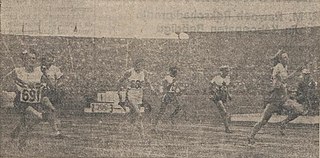
The women's 100 metres sprint event at the 1948 Olympic Games took place July 31 and August 2. The final was won by Dutchwoman Fanny Blankers-Koen.
The women's 200 metres sprint event at the 1948 Olympic Games took place on August 5 and August 6. The final was won by Dutch athlete Fanny Blankers-Koen. It was the first time this event was included in the Summer Olympics.
The men's 100 metres sprint event at the 1952 Olympic Games in Helsinki, Finland was held at the Olympic Stadium on 20 and 21 July. Seventy-two athletes from 33 nations competed; each nation was limited to 3 runners. The final was won by American Lindy Remigino, the fourth consecutive victory by a different American. Herb McKenley won Jamaica's first medal in the men's 100 metres with his silver, while McDonald Bailey's bronze put Great Britain on the podium for the first time since 1928. The final was "probably the closest mass finish in Olympic 100 metre history" with the first four runners all clocking in at 10.4 seconds hand-timed, all six finalists within 0.12 seconds electric-timed, and a photo finish necessary to separate the winners.
The men's 100 metres sprint event at the 1968 Olympic Games took place at Estadio Olímpico Universitario in Mexico City, Mexico, on October 13 and 14. Sixty-five athletes from 42 nations took part. Each nation was limited to 3 runners by rules in place since the 1930 Olympic Congress. The final was won by American Jim Hines, the second consecutive time the event was won by an American. Jamaica won its first medal in the event since 1952.
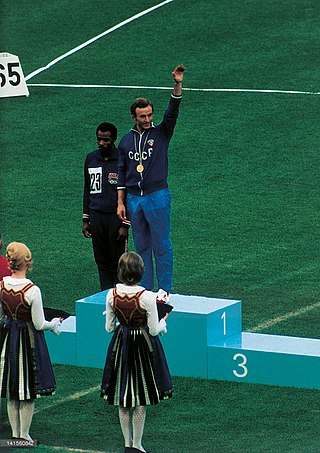
The men's 100 metres sprint event at the 1972 Olympic Games in Munich, West Germany, was held at Olympiastadion on 31 August and 1 September. Eighty-five athletes from 55 nations competed. Each nation was limited to 3 athletes per rules in force since the 1930 Olympic Congress. The event was won by Valeriy Borzov of the Soviet Union, the first medal in the men's 100 metres for that nation. Jamaican Lennox Miller, silver medalist four years earlier, became the second man to make the podium twice in the event by taking bronze.
The men's 100 metres sprint event at the 1984 Olympic Games took place between August 3 and August 4. Eighty-two athletes from 59 countries participated. Each nation was limited to 3 athletes per rules in force since the 1930 Olympic Congress. The event was won by Carl Lewis of the United States, that nation's first title after two Games of missing the podium. Canada's Ben Johnson took bronze to break up the Americans' bid to sweep the podium ; it was Canada's first medal in the event since 1964.
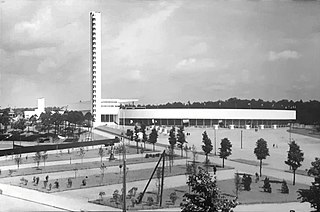
The men's 200 metres sprint event at the 1952 Olympic Games took place between July 22 and July 23. There were 71 competitors from 35 nations. The maximum number of athletes per nation had been set at 3 since the 1930 Olympic Congress. The final was won by 0.16 seconds by American Andy Stanfield. Americans also took silver and bronze as the United States swept the medals in the event for the third time.
The men's 400 metres sprint event at the 1952 Olympic Games took place between July 24 and July 25. Seventy-one athletes from 35 nations competed. The maximum number of athletes per nation had been set at 3 since the 1930 Olympic Congress. The event was won by 0.11 seconds by George Rhoden of Jamaica, the second consecutive title in the event by a Jamaican. Herb McKenley repeated his silver medal performance from 1948, becoming the second man to win two medals in the event.
The men's 800 metres middle distance event at the 1960 Olympic Games took place between August 31 and September 2. Fifty-one athletes from 35 nations competed. The maximum number of athletes per nation had been set at 3 since the 1930 Olympic Congress.
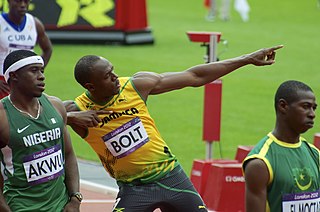
The men's 200 metres competition at the 2012 Summer Olympics in London, United Kingdom was held at the Olympic Stadium on 7–9 August. There were 54 competitors from 40 nations. The event was won by Usain Bolt of Jamaica, the first man to repeat as champion in the 200 metres. His teammates Yohan Blake (silver) and Warren Weir (bronze) completed the medal sweep; it was the seventh sweep in the men's 200 metres and the first by a nation other than the United States. Bolt's gold medal was Jamaica's third in the event, moving out of a tie with Canada and Italy for second-most overall.













